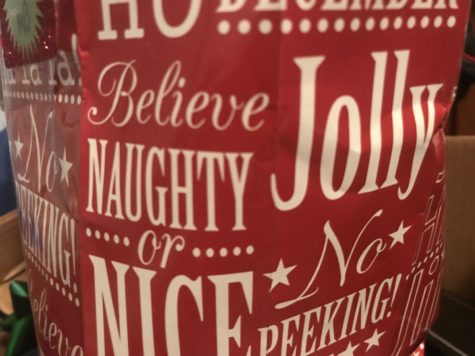Happy Holidays vs. Merry Christmas
What is the correct way to spread cheer during the holidays?
In room 106, Mrs. Wathen’s class partakes in holiday festivities.
Today, the United States has become a hub of diversity. With many citizens belonging to different ethnic groups, they tend to have their own respective days to celebrate. For example, those of African descent celebrate their roots through Kwanzaa, which starts on December 26th and ends on January 1st. Celebrants partake in feasting, gift giving, and musical celebrations. Other popular holidays in the U.S. include Hanukkah, Diwali, Chinese New Year, and Solstice. However, Christmas remains the most celebrated winter holiday.

According to the Washington Times, with 90% of Americans celebrating Christmas annually, it is understandable why many Americans tend to wish each other, “Merry Christmas!” However, due to growing diversity awareness in the U.S., more and more people are watching their language and wishing each other, “Happy Holidays!” This can be attributed to the fact that most people don’t want to offend those who celebrate other holidays. Many tend to forget that even though our founding fathers were immigrants, they were also Christians. Therefore, people shouldn’t be offended when some say, “Merry Christmas.” Polls even show that the majority of those who don’t celebrate Christmas have no problem with the phrase. Currently, people constantly demand political correctness. However, the problem with that is the right to free speech. People can be offended, but simply saying the phrase, “Merry Christmas” is not considered hate speech. This is protected by the First Amendment.

Even though there is a political debate about the phrase, most tend to disregard it. Lafayette High School student Abdullah Suid states, “I don’t celebrate Christmas. However, I’ve never been offended when people wish me ‘Merry Christmas!’ It actually makes me feel good. It’s almost like people are just wishing me a happy holiday season instead, no matter what I celebrate.” This goes to show that Christmas isn’t necessarily directly associated with Christianity. Instead it’s becoming more of a nationally celebrated, secular holiday that caters to people of all religions. Lafayette Senior Christian Hankins says, “Christmas is the celebration of the birth of Christ. However, it seems like Christmas is becoming more about things like Christmas parties, ugly sweaters, and presents. People still shouldn’t forget what originated the holiday.”
Christmas isn’t something that only Christians celebrate. In fact, PewResearch.org states that 81% of non-Christians celebrate Christmas. Hankins goes on to say, “My family doesn’t go to church every Sunday, but we do celebrate Christmas. Many of my friends have never been to church and they still celebrate Christmas, which I think is fine. Christmas should be thought of as an inclusive holiday.” I agree with Hankins here. Christians shouldn’t discriminate. If someone wants to celebrate Christmas, they should have the right to.

Another LHS Senior, Ghazi Alawy, says, “My family is from Kenya. We usually go over there during the holiday season. However, when people say Merry Christmas to me, I don’t really mind. Everyone usually knows that I don’t celebrate Christmas, but I give those who don’t know a pass. There’s no way that they could know right off the bat because I don’t have an accent. I’m a normal student and participate in holiday activities like everyone else. For example, I play the tuba in the LHS band. We play songs relating to Christmas and I have no problem with it. Everyone that grew up in the U.S. knows these songs as jingles. When I play these songs, Christ isn’t the first thing that comes to mind. It’s more about the holiday season for me. It reminds me of things like giving presents, snow, and friends.” Alawy makes an excellent point. Nowadays, Christmas is more about celebrating the good things in life and giving to the less fortunate. More people ought to include those who may not get presents, have family, or acquaintances to celebrate with.

Overall, people don’t get too offended when you say either “Happy Holidays,” or “Merry Christmas!” Some may have strong opinions on this, but I think it doesn’t matter what people say. Nobody should truly get offended because people are just wishing each other a joyous holiday season, no matter their religion. After all, isn’t the holiday season all about coming together?




adviser • Dec 19, 2018 at 10:10 AM
It was very good to have both sides of the argument! I enjoyed reading it!
Jarel White • Dec 19, 2018 at 9:54 AM
Great photos and great content! It appears you had a spectacular editor! Awesome Job! 😀
Sean Long • Dec 19, 2018 at 9:47 AM
Merry Christmas is the better choice even though if your not Christian its kinda of know